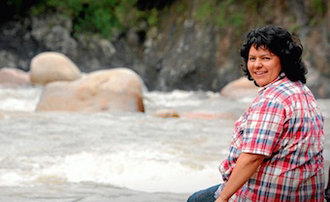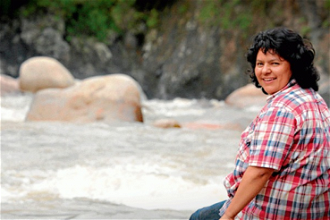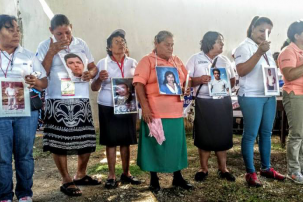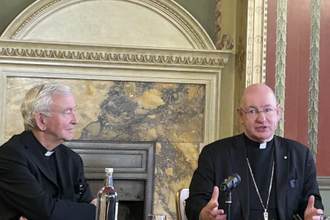International Women's Day: Remembering Berta Caceres

Berta Caceres
This year we commemorate the fifth anniversary of the martyrdom of Berta Caceres, an indigenous environmental activist from Honduras who was cruelly assassinated in her home on March 3, 2016, just one day before her 45th birthday on March 4. She is one of hundreds of environmental defenders from across the world who have been killed for their defence of creation and protection of the sacred lands and sacred waters.
The following reflection is a tribute to the witness of Berta and her Lenca community, and indigenous leaders and communities across the world, to the transformation of our common home.
We live in a world radiant with beauty and one that is also crying out for redemption. The entire Creation is filled with the colours of the seasons of Creation, at the same time it is groaning under the impact of climate change: extreme weather events, devastating floods, and severe droughts, rising sea levels and melting glaciers, disappearing habitats, and disappearing species of life. But this drama is not confined to the impact of climate change alone. Transnational mining companies, oil pipelines and hydroelectric dams that provide electricity for their mining ventures, are ravishing the lands and polluting the waters, and indigenous communities across the Americas are making a stand to protect Creation.
History is filled with inspiring examples of nonviolent resistance, from Gandhi's independence struggle in India, to Martin Luther King's struggle for civil rights and Cesar Chavez's struggle for farmworker justice in the United States.
But something new is happening here; there are new "signs" on the horizon. The stakes - the fate of the Earth and future generations - are higher; the protagonists are new - with indigenous communities and women playing a crucial role; and the spirituality of nonviolence is deeper and more holistic - rooted in the gift of Creation.
One of the more remarkable nonviolent struggles in recent years came to light when a young indigenous leader and mother of four children was assassinated in La Esperanza, Honduras. On the night of March 2, 2016, Honduran environmental and indigenous leader Berta Cáceres was brutally murdered in her home. As co-founder of the Civic Council of Popular and Indigenous Organisations of Honduras (COPINH), Berta had led the Lenca people and other indigenous communities in a non-violent struggle for the integrity of their territories and their sovereignty.
For years, Berta and the Lenca communities courageously fought to block the Agua Zarca hydroelectric project which would create a series of dams, flood large areas of land, and cut off the supply of water, food, and medicine to the Lenca peoples. In addition, this project violated the sovereignty and the rights of indigenous people to decide whether such mega-projects be undertaken at all. Berta was persecuted and received numerous death threats for her work to defend the sacred rivers, forests, and lands from further desecration.
Since the military coup in Honduras in 2009, and the continuing support of the United States for a repressive, corrupt government linked to drug cartels and extrajudicial disappearances and executions, more than 150 land and environmental activists have been assassinated, and hundreds of mining concessions have been offered to transnational mining companies, many of them tied to hydroelectric dams to generate the electricity required by their operations.
What does this mean, then, for the future of Berta's people, and the future of her land? Is nonviolent resistance an effective means to create peace, democracy, and sustainability?
Surely the Lenca people have been faithful to their indigenous values and spirituality, rooted in a reverence for Creation. Surely, they have and continue to pay a high cost. They have been faithful, yet people often ask, have they been effective? Does their nonviolent resistance offer any hope? I would answer "Yes", and here are three reasons why.
First, because the stakes are so high, and the fate of the Earth and of future generations hangs in balance, the witness of Berta Caceres and the nonviolent resistance of the Lenca community of which she was a part, has had a profound impact throughout the world. This is due, in part, because Berta was so well known, the personal recipient of the Goldman Prize for environmental activists, and a personal invitee of Pope Francis to the World Meeting of Popular Movements in Rome in 2015.
A case could be made that Berta was a 'Laudato Si' martyr, in a long line of martyrs defending the Earth. Pope Francis' encyclical 'Laudato Si' is just one sign of the impact that indigenous communities defending Creation has had on the Church and on the world, but there are many more. Three years ago, Catholic organisations in Latin America helped form the Church and Mining Network to defend the indigenous peoples and the natural resources of the continent. In like manner, the Pan-Amazonic Church Network (REPAM) was formed to defend the Amazon region and has since spread to the Congo Basin in Africa and to Asia as well. On the morning after Berta Caceres was killed, REPAM joined the Global Catholic Climate Movement (GCCM) to offer this message:
"We join our voices to thousands of people…. Berta Caceres' death unites us in a mission in the defence of life, the Earth, and the rights of future generations. This death cries out, rather than silences us. It moves us and calls us to resist and to demand justice."
Second, nonviolent resistance is effective and hopeful because people are listening to indigenous peoples and to women as the protectors of the land and the water and waking up to hear "the cry of the Earth" and the "cry of the poor." Berta, the Lenca people and countless indigenous peoples around the world are the first defenders and the last protectors of Creation. If we don't listen to them, the future is dismal. But people are listening and beginning to take seriously the fate of the planet and the fate of present and future generations. Many have had, thanks to social media, the good fortune to hear Berta's voice.
At the 2015 Goldman Prize awards ceremony in San Francisco, Berta spoke briefly, and eloquently. For me, her words evoked memories of Dr. Martin Luther King, Jr.'s "I've Been to the Mountaintop" speech and Archbishop Oscar Romero's "In the name of God, stop the repression" homily, both given on the eve of their assassinations and martyrdoms. Like them, Berta sealed her fate with words of hope and defiance in her acceptance speech that night:
"Let us wake up! Let us wake up, humanity! We're out of time. We must shake our conscience free of the rapacious capitalism, racism, and patriarchy that will only assure our own self-destruction. The Gualcarque River has called upon us, as have other gravely threatened rivers. We must answer their call. Our Mother Earth - militarised, fenced-in, poisoned, a place where basic rights are systematically violated - demands that we take action. Let us build societies that are able to coexist in a dignified way, in a way that protects life."
A new spirituality of nonviolence is emerging, one that is deeply tied to the fate of the Earth and the gift of Creation, and that is a third reason why the nonviolent resistance of indigenous communities like the Lenca people protecting Creation is effective and hopeful. We can see that closer to home, in the gathering of Native Americans at Standing Rock, North Dakota. We know, if we do not listen and respond with solidarity, the fate not only of Native Americans but of the lands and waters of the planet are at stake. We desperately need to learn from the wisdom of original peoples.
Just listen to Berta's words at her acceptance speech for the Goldman Prize:
"In our worldviews, we are beings who come from the Earth, from the water, and from the corn. The Lenca people are ancestral guardians of the rivers, in turn protected by the spirits of young girls. They teach us that giving our lives in various ways for the protection of the rivers is giving our lives for the well-being of humanity and of this planet. Walking alongside people struggling for their emancipation validates this commitment to continue protecting our waters, the rivers, our shared resources and nature in general, as well as our rights as a people."
Our spiritual traditions are deeply enriched by the spirituality of indigenous peoples rooted in the gift of Creation. For Christians, we know that the joy of Easter means that life, not death, will have the last word. But even as we anticipate and eventually celebrate the joy of Easter, the passion of the Earth and the passion of the poor continues in the drama of these nonviolent struggles of indigenous peoples for life and for all of Creation. During our Lenten journey, we express our gratitude to indigenous communities and environmental protectors like Berta for their prophetic witness and pray to the Spirit that unites us all and binds us to Creation: "Come Holy Spirit and renew the face of the Earth."
Scott Wright is Director of the Columban Center for Advocacy and Outreach in Washington. He knew Berta Caceres and attended her funeral.
LINK
Columban Centre - https://columbancenter.org/

















